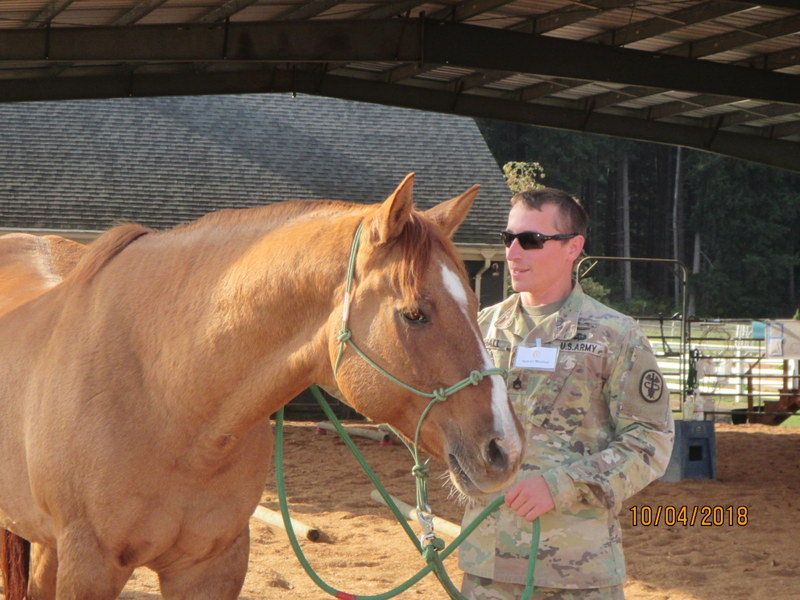When you breathe, they breathe. If you stand still, they stand still. If you react, they react. The subtlest change in you, be it a quickened heart rate, a catch of breath, a slight body tremor – undetected by most – is seen and felt by a horse. And they respond. It is this sensitivity to our moods that makes equines the perfect therapist for our veterans. Robert Woelk and his wife Debbi Fisher use a horse’s natural “mirroring” ability at Hope for Heroes Horsemanship Center, a Yelm-based 501(c)3 non-profit program for veterans and active duty military personnel suffering from post-traumatic stress disorder (PTSD).
 “Horses have a unique, survival instinct that allows them to detect anxiety within humans that no other human or animal can detect,” explains Robert. “It’s called ‘mirroring,’ and it tells the veteran when the veteran does or does not have anxiety. As soon as the vet lowers their anxiety, the horse immediately calms down. This is crucial, because we believe these veterans have, to a degree, lost their ability to detect their own anxiety and also their ability to know how to control it. With the horse ‘mirroring’ back to the vet, the horse teaches the vet how to reconnect and self-manage this anxiety. This anxiety has totally destroyed the vet’s life, and by regaining the ability to manage it, they basically get their whole life back.”
“Horses have a unique, survival instinct that allows them to detect anxiety within humans that no other human or animal can detect,” explains Robert. “It’s called ‘mirroring,’ and it tells the veteran when the veteran does or does not have anxiety. As soon as the vet lowers their anxiety, the horse immediately calms down. This is crucial, because we believe these veterans have, to a degree, lost their ability to detect their own anxiety and also their ability to know how to control it. With the horse ‘mirroring’ back to the vet, the horse teaches the vet how to reconnect and self-manage this anxiety. This anxiety has totally destroyed the vet’s life, and by regaining the ability to manage it, they basically get their whole life back.”
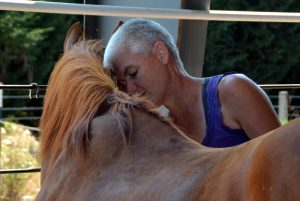
Imagine feeling out of control of your emotions – especially fear, stress and anxiety. Imagine not knowing when an episode may come, or how to stop it when it does. For these veterans, often, it can feel like there is no way to escape the aftermath of service. Many come to the conclusion that there is only one way to truly escape, and that’s to end it all. Robert shared statistics from the Veterans Administration that reports 70 percent of veterans suffering from PTSD choose not to receive therapy. Of that group, many isolate themselves in their home as the best line of defense. And 22 of them will commit suicide each day.
A Desperate Need
Debbi and Robert met in 2008, both with a passion to help their local community. In 2009, they attended a Professional Association of Therapeutic Horsemanship (PATH) conference. “At the conference, we listened to a panel of veterans tell how their horse had literally saved their lives from suicide,” says Robert. “We’ve been pretty committed since then.”
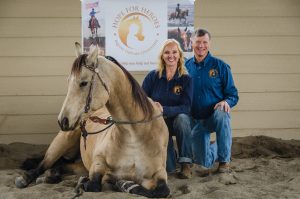
Their first project was Rainer Therapeutic Riding in 2010, but in 2015, it was time for a change to focus even more heavily on veterans. Knowing the suicide rate, the couple saw a desperate need for anything that may help the veterans and active duty personnel. And so, Hope for Heroes was born and it grew quickly. “Our current program has served 43 veterans and active duty in our first 4 months of operation,” says Robert. “We also offer consulting to horse centers trying to start up veteran programs.”
Debbi has been a horsewoman her entire life. She has studied Clinton Anderson horsemanship methods for 20 years, having gone to many of his workshops. She has also been involved at an adult with local 4-H and high school equestrian teams. She is a PATH and ESMHL certified instructor. She uses her own knowledge and expertise when teaching classes and training her volunteer instructors. As a non-profit, they depend on volunteers to provide local veterans with this life-saving service.
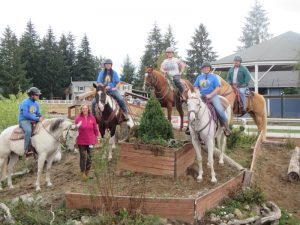
Bolender Horse Park in Silver Creek also donates the use of their space for free and does clinics with the veterans at no cost. Debbi has been a long time competitor at the park and the Bolenders were more than pleased to give back to those who serve our country.
Studies Say it Works
Debbi has developed a full, published lesson plan for veteran programs. And it the Hope of Heroes lesson plan that was used by Baylor University for their study on the effectiveness of horse therapy for PTSD. Originally published June of 2017, the study shows that being around horses produced a “clinical meaningful change” in PTSD scores of veterans during just 8 weekly class sessions. Data showed about 50 percent reduction in the average PTSD scores. Separate research conducted by University of Missouri at Columbia and published in January 2018, had almost identical results.
But perhaps more powerful, is the first-hand changes that Robert and Debbi see themselves at Hope for Heroes. “New participants usually come to us with long faces and no smiles,” shares Robert. “By class weeks 4 to 6, we see smiles and energy that didn’t exist before. Participants who came to us from a suicide ward are today going to college, driving a car, successful at a job or pursuing their dreams. One veteran has started his own horse program for veterans in central Pennsylvania. We also hear from spouses that their husband or wife have been tremendously changed in a very good way.”
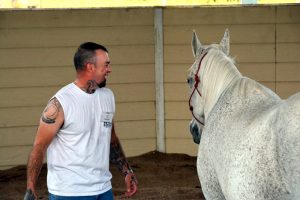
Robert shared just a few stories from the veterans they have helped.
Patrick was totally house-bound by his PTSD, and had to be driven to our program by his landlady. Today, he is driving his car and working as a baggage handler at a local airport.
Brittany came to us from the suicide ward at JBLM. After completing several 8-week semesters of our program, she is living near her family in California after completing her college degree and has a successful job.
Zed was a Special Forces vet who was suicidal and who rode horses on covert missions in Afghanistan similar to the recent movie 12 Strong. Since working our program for a year, he has started his own horse program for veterans in central Pennsylvania. He has also competed in the annual Mustang Million national competition.
Aaron was on 24-hour suicide watch at JBLM and had already written his “suicide letter” when he came out to our program and met Fred the horse. Fred helped him change his mind about suicide, and he became one of our program instructors. He and Fred were featured in the short documentary film Riding My Way Back, which won dozens of awards around the country, including best film at the GI Film Festival in Washington DC and the Equus Film Festival in New York City.

And Robert and Debbi receive something too. “The work we do with our programs has been a big strength to our relationship,” they share.
How You Can Help
Robert and Debbi want everyone to realize how important these centers are for veterans; the studies prove their effectiveness and they are hoping that others will start their own programs. They are happy to help those who are looking, including providing their curriculum. Those who are unable to start their own program, can volunteer at a local organization or donate.
If you or someone you know could use Hope for Heroes services, don’t wait to contact them. You can find out more on the Hope For Heroes website, email Debbi at debbi@hope4heroesconsulting.org or call them at 360.485.8223.







































